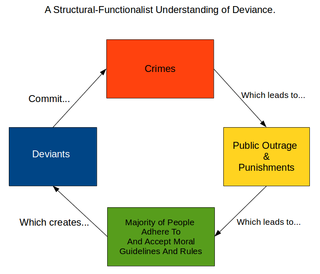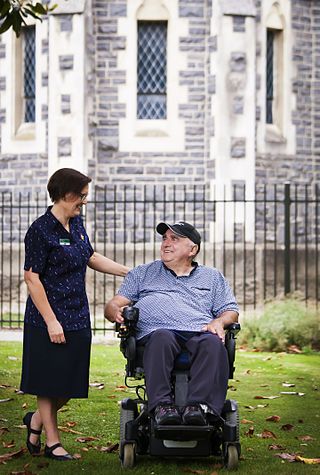Related Research Articles
A mental disorder, also referred to as a mental illness or psychiatric disorder, is a behavioral or mental pattern that causes significant distress or impairment of personal functioning. A mental disorder is also characterized by a clinically significant disturbance in an individual’s cognition, emotional regulation, or behaviour. It is usually associated with distress or impairment in important areas of functioning. There are many different types of mental disorders. Mental disorders may also be referred to as mental health conditions. Such features may be persistent, relapsing and remitting, or occur as single episodes. Many disorders have been described, with signs and symptoms that vary widely between specific disorders. Such disorders may be diagnosed by a mental health professional, usually a clinical psychologist or psychiatrist.

Social work is an academic discipline and practice-based profession concerned with meeting the basic needs of individuals, families, groups, communities, and society as a whole to enhance their individual and collective well-being. Social work practice draws from areas, such as psychology, sociology, health, political science, community development, law, and economics to engage with systems and policies, conduct assessments, develop interventions, and enhance social functioning and responsibility. The ultimate goals of social work include the improvement of people's lives, alleviation of biopsychosocial concerns, empowerment of individuals and communities, and the achievement of social justice.

The National Alliance on Mental Illness (NAMI) is a United States-based nonprofit organization originally founded as a grassroots group by family members of people diagnosed with mental illness. NAMI identifies its mission as "providing advocacy, education, support and public awareness so that all individuals and families affected by mental illness can build better lives" and its vision as "a world where all people affected by mental illness live healthy, fulfilling lives supported by a community that cares". NAMI offers classes and trainings for people living with mental illnesses, their families, community members, and professionals, including what is termed psychoeducation, or education about mental illness. NAMI holds regular events which combine fundraising for the organization and education, including Mental Illness Awareness Week and NAMIWalks.

Mental health encompasses emotional, psychological, and social well-being, influencing cognition, perception, and behavior. It likewise determines how an individual handles stress, interpersonal relationships, and decision-making. Mental health includes subjective well-being, perceived self-efficacy, autonomy, competence, intergenerational dependence, and self-actualization of one's intellectual and emotional potential, among others. From the perspectives of positive psychology or holism, mental health may include an individual's ability to enjoy life and to create a balance between life activities and efforts to achieve psychological resilience. Cultural differences, subjective assessments, and competing professional theories all affect how one defines "mental health". Some early signs related to mental health difficulties are sleep irritation, lack of energy, lack of appetite and thinking of harming yourself or others.
The Hearing Voices Movement (HVM) is the name used by organizations and individuals advocating the "hearing voices approach", an alternative way of understanding the experience of those people who "hear voices". In the medical professional literature, ‘voices’ are most often referred to as auditory verbal hallucinations. The movement uses the term ‘hearing voices’, which it feels is a more accurate and 'user-friendly' term.

Suicide prevention is a collection of efforts to reduce the risk of suicide. Suicide is often preventable, and the efforts to prevent it may occur at the individual, relationship, community, and society level. Suicide is a serious public health problem that can have long-lasting effects on individuals, families, and communities. Preventing suicide requires strategies at all levels of society. This includes prevention and protective strategies for individuals, families, and communities. Suicide can be prevented by learning the warning signs, promoting prevention and resilience, and committing to social change.
Recovery International is a mental health self-help organization founded in 1937 by neuropsychiatrist Abraham Low in Chicago, Illinois. Recovery's program is based on self-control, self-confidence, and increasing one's determination to act. Recovery deals with a range of people, all of whom have difficulty coping with everyday problems, whether or not they have a history of psychiatric hospitalization. It is non-profit, secular, and although it uses methods devised by Low, most groups are currently led by experienced non-professionals.

Mind is a mental health charity in England and Wales. Founded in 1946 as the National Association for Mental Health (NAMH), it celebrated its 70th anniversary in 2016.
Peer support occurs when people provide knowledge, experience, emotional, social or practical help to each other. It commonly refers to an initiative consisting of trained supporters, and can take a number of forms such as peer mentoring, reflective listening, or counseling. Peer support is also used to refer to initiatives where colleagues, members of self-help organizations and others meet, in person or online, as equals to give each other connection and support on a reciprocal basis.
The psychosocial approach looks at individuals in the context of the combined influence that psychological factors and the surrounding social environment have on their physical and mental wellness and their ability to function. This approach is used in a broad range of helping professions in health and social care settings as well as by medical and social science researchers.
A mental health professional is a health care practitioner or social and human services provider who offers services for the purpose of improving an individual's mental health or to treat mental disorders. This broad category was developed as a name for community personnel who worked in the new community mental health agencies begun in the 1970s to assist individuals moving from state hospitals, to prevent admissions, and to provide support in homes, jobs, education, and community. These individuals were the forefront brigade to develop the community programs, which today may be referred to by names such as supported housing, psychiatric rehabilitation, supported or transitional employment, sheltered workshops, supported education, daily living skills, affirmative industries, dual diagnosis treatment, individual and family psychoeducation, adult day care, foster care, family services and mental health counseling.
The psychiatric survivors movement is a diverse association of individuals who either currently access mental health services, or who are survivors of interventions by psychiatry.
The recovery model, recovery approach or psychological recovery is an approach to mental disorder or substance dependence that emphasizes and supports a person's potential for recovery. Recovery is generally seen in this model as a personal journey rather than a set outcome, and one that may involve developing hope, a secure base and sense of self, supportive relationships, empowerment, social inclusion, coping skills, and meaning. Recovery sees symptoms as a continuum of the norm rather than an aberration and rejects sane-insane dichotomy.

Forensic social work is the application of social work to questions and issues relating to the law and legal systems. It is a type of social work that involves the application of social work principles and practices in legal, criminal, and civil contexts. It is a specialized branch of social work that focuses on the intersection of law and mental health. Forensic social work is an important part of the criminal justice system and provides an important link between mental health and the legal system.

A caregiver or carer is a paid or unpaid member of a person's social network who helps them with activities of daily living. Since they have no specific professional training, they are often described as informal caregivers. Caregivers most commonly assist with impairments related to old age, disability, a disease, or a mental disorder.
Self-help groups for mental health are voluntary associations of people who share a common desire to overcome mental illness or otherwise increase their level of cognitive or emotional wellbeing. Despite the different approaches, many of the psychosocial processes in the groups are the same. Self-help groups have had varying relationships with mental health professionals. Due to the nature of these groups, self-help groups can help defray the costs of mental health treatment and implementation into the existing mental health system could help provide treatment to a greater number of the mentally ill population.
Collaborative therapy is a therapy developed by Harlene Anderson, along with Harold A. Goolishian (1924–1991), in the USA. It is intended for clients who are well educated in any field, or for those that have distrust of psychotherapists due to past negative experiences with one or more.
Personal boundaries or the act of setting boundaries is a life skill that has been popularized by self help authors and support groups since the mid-1980s. Personal boundaries are established by changing one's own response to interpersonal situations, rather than expecting other people to change their behaviors to comply with your boundary. For example, if the boundary is to not interact with a particular person, then one sets a boundary by deciding not to see or engage with that person, and one enforces the boundary by politely declining invitations to events that include that person and by politely leaving the room if that person arrives unexpectedly. The boundary is thus respected without requiring the assistance cooperation of any other people. Setting a boundary is different from issuing an ultimatum; an ultimatum is a demand that other people change their choices so that their behavior aligns with the boundary-setter's own preferences and personal values.
The Tidal Model is a recovery model for the promotion of mental health developed by Phil Barker, Poppy Buchanan-Barker and their colleagues. The Tidal Model focuses on the continuous process of change inherent in all people. It seeks to reveal the meaning of people's experiences, emphasising the importance of their own voice and wisdom through the power of metaphor. It aims to empower people to lead their own recovery rather than being directed by professionals.

In a study in Western societies, homeless people have a higher prevalence of mental illness when compared to the general population. They also are more likely to suffer from alcoholism and drug dependency. It is estimated that 20–25% of homeless people, compared with 6% of the non-homeless, have severe mental illness. Others estimate that up to one-third of the homeless have a mental illness. In January 2015, the most extensive survey ever undertaken found 564,708 people were homeless on a given night in the United States. Depending on the age group in question and how homelessness is defined, the consensus estimate as of 2014 was that, at minimum, 25% of the American homeless—140,000 individuals—were seriously mentally ill at any given point in time. 45% percent of the homeless—250,000 individuals—had any mental illness. More would be labeled homeless if these were annual counts rather than point-in-time counts. Being chronically homeless also means that people with mental illnesses are more likely to experience catastrophic health crises requiring medical intervention or resulting in institutionalization within the criminal justice system. Majority of the homeless population do not have a mental illness. Although there is no correlation between homelessness and mental health, those who are dealing with homelessness are struggling with psychological and emotional distress. The Substance Abuse and Mental Health Services Administration conducted a study and found that in 2010, 26.2 percent of sheltered homeless people had a severe mental illness.
References
- ↑ Leff, J.P., Warner, R. (2006) Social inclusion of people with mental illness p.96. Cambridge University Press. ISBN 0-521-61536-4. Retrieved October 2011.
- 1 2 3 Hewitt, R.D'O. (2007) Moving on: a guide to good health and recovery for people with a diagnosis of schizophrenia, p.99. Karnac Books. ISBN 1-85575-442-8. Retrieved October 2011.
- 1 2 Susan Balloch, S., Hill, M.J. (2007) Care, community and citizenship: research and practice in a changing policy context p.203. The Policy Press. ISBN 1-86134-870-3. Retrieved October 2011.
- ↑ Abel, K. (1996) Planning community mental health services for women: a multiprofessional handbook p.229. Routledge. ISBN 0-415-11456-X. Retrieved October 2011.
- ↑ Somerville, P., Steele, A. (2002) Race, housing and social exclusion p.186. Jessica Kingsley Publishers. ISBN 1-85302-849-5. Retrieved October 2011.
- ↑ Newton, J. (1997) Preventing Mental Illness in Practice p.11. Routledge. ISBN 0-415-11993-6. Retrieved October 2011.